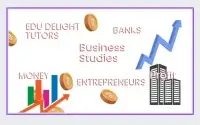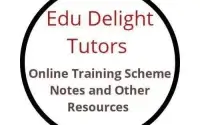Mid Term Test Structure English Grammar JSS 1 Second Term Lesson Notes Week 7
Subject: English Grammar
Class: JSS 1
Term: Second Term
Week: 7 (Mid-Term Assessment and Break)
Age (in years): 12-14
Topic: Mid-Term Assessment
Sub-topic: Review and Assessment of Topics Covered in the First Half of the Term
Duration: 40 minutes
Assessment Components:
Part A: Objective Questions
(20 fill-in-the-blank questions with options a, b, c, or d, based on topics covered in the mid-term)
- I ________ to the market yesterday.
a) go
b) went
c) will go
d) am going - She ________ never been to Nigeria.
a) have
b) had
c) has
d) is - We ________ playing football when it started raining.
a) were
b) is
c) has
d) are - They ________ the movie last night.
a) watched
b) have watched
c) watches
d) is watching - He ________ his homework already.
a) have finished
b) finished
c) has finished
d) is finishing - She ________ always read books before bedtime.
a) have
b) has
c) is
d) was - By the time we arrived, they ________ already left.
a) have
b) had
c) was
d) has - We ________ eating when our guests arrived.
a) were
b) are
c) have
d) is - The dog ________ outside when it started raining.
a) was
b) is
c) has
d) were - I ________ my keys this morning.
a) lost
b) have lost
c) am losing
d) lose - She ________ to the office every day.
a) go
b) goes
c) gone
d) is going - I ________ my homework by tomorrow.
a) will complete
b) completed
c) completes
d) is completing - They ________ at the party when we arrived.
a) dance
b) dancing
c) were dancing
d) is dancing - By next year, I ________ this course.
a) completed
b) have completed
c) will have completed
d) completes - She ________ a letter to her friend yesterday.
a) write
b) wrote
c) writes
d) has written - They ________ lunch when I called.
a) are having
b) have had
c) were having
d) will have - I ________ never seen a lion before.
a) have
b) am
c) was
d) is - We ________ just finished our project.
a) has
b) have
c) will
d) are - By the time you come, I ________ the work.
a) will finish
b) will have finished
c) have finished
d) finish - He ________ not eaten breakfast yet.
a) has
b) have
c) is
d) had
Part B: Theory Questions
(20 short answer questions covering key concepts from the mid-term topics)
- Define the present tense and give an example.
- How do you form a sentence in the past tense? Provide an example.
- What is the difference between the present perfect tense and the past tense?
- Write a sentence using the past continuous tense.
- How do you form a negative sentence in the present perfect tense?
- What is the role of “will” and “shall” in future tense construction? Provide examples.
- What is the purpose of using the future tense? Give an example.
- How can you use “be going to” for future actions? Provide an example.
- How do you form a question in the present perfect tense? Give an example.
- What does the past tense express? Provide an example.
- Write a sentence in the present tense that expresses a habit.
- In what situations is the present perfect tense used? Give an example.
- How do you change a sentence from positive to negative in the present perfect tense?
- What is the difference between “have gone” and “have been”? Provide examples.
- Give two examples of sentences that use the simple future tense.
- What is a past participle? Provide two examples.
- How do you form a sentence in the past tense using an irregular verb? Give an example.
- What is the rule for adding “ed” to regular verbs in the past tense?
- Write a sentence in the present continuous tense and explain when it is used.
- Write a sentence using the future continuous tense.
Part C: True or False Questions
(20 True or False statements related to the mid-term topics)
- The past tense is used to describe actions that happen now. (True/False)
- “Have” and “has” are used in the present perfect tense. (True/False)
- “Will” is used to talk about actions that happened in the past. (True/False)
- The present continuous tense expresses actions happening now. (True/False)
- The future tense is used to describe actions that have already been completed. (True/False)
- The past perfect tense is used to talk about actions completed before another past action. (True/False)
- “She have eaten lunch” is a correct sentence in the present perfect tense. (True/False)
- The present perfect tense can express actions with no definite time frame. (True/False)
- “I saw him” is a correct sentence in the future tense. (True/False)
- The present perfect tense is formed by using “have/has” plus the base verb. (True/False)
- The future tense is always formed by using “will” or “shall.” (True/False)
- “She will be singing” is a sentence in the future continuous tense. (True/False)
- The past tense is used to describe habitual actions. (True/False)
- “I have gone to the store” is an example of the present perfect tense. (True/False)
- The past continuous tense is used to describe actions happening at a specific time in the past. (True/False)
- “They will go to school tomorrow” is a sentence in the present tense. (True/False)
- The future continuous tense is used to describe actions that will be ongoing in the future. (True/False)
- “She is cooking now” is an example of a sentence in the past tense. (True/False)
- “We have eaten” is a present perfect tense sentence. (True/False)
- The simple future tense is used to describe something that is happening right now. (True/False)
Part D: Fill-in-the-Gaps Questions
(20 fill-in-the-blank questions without multiple-choice options)
- I ________ to the market yesterday.
- She ________ just finished her homework.
- By next year, I ________ completed the course.
- They ________ at the party when I arrived.
- He ________ not gone to the office today.
- I ________ never visited that city.
- We ________ been waiting for two hours.
- I ________ met her at the party last week.
- By the time we get there, they ________ left.
- She ________ already eaten dinner.
- They ________ to the cinema yesterday evening.
- He ________ worked at this company for 5 years.
- I ________ seen that movie before.
- She ________ finished all her chores before dinner.
- We ________ studied for the exam for two hours.
- The children ________ playing outside when it started to rain.
- I ________ just completed my project.
- They ________ traveled to several countries last year.
- He ________ gone to bed already.
- I ________ never eaten sushi.
This mid-term assessment covers all key topics learned during the first part of the term and provides students with the opportunity to demonstrate their understanding of English grammar concepts such as present, past, and future tenses, as well as the present perfect tense.


